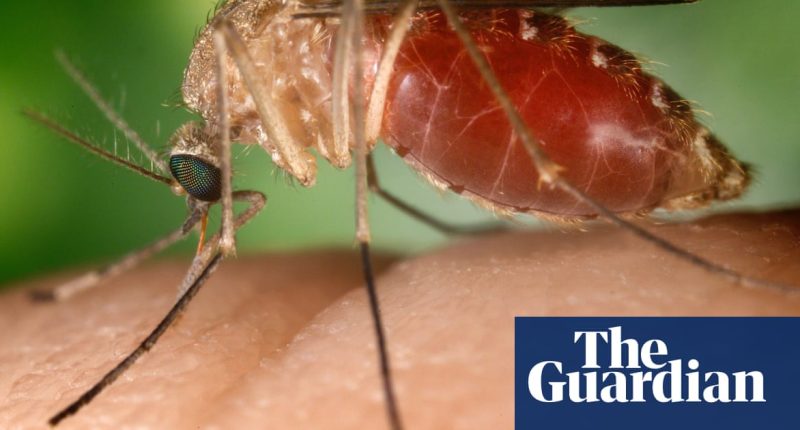Share this @internewscast.com
Climate change could make the UK vulnerable to insect-transmitted tropical diseases that were previously only found in hot countries, scientists have warned, urging ministers to redouble efforts to contain their spread abroad.
Leading mosquito experts said the government’s cuts to international aid would lead to a collapse in crucial surveillance, control and treatment programmes in endemic countries, leading to more deaths.
This week, the UK Health Security Agency announced the discovery of West Nile virus in UK mosquitoes for the first time. The agency said it had found no evidence of transmission to humans and the risk to the British public was low.
West Nile virus is transmitted by mosquitoes and, like dengue fever, chikungunya and zika, used to be confined to hotter regions of the world. But global heating has expanded the geographical spread of West Nile virus and other tropical diseases into cooler areas, including parts of northern and western Europe. In 2024, there were more than 1,400 cases of locally acquired West Nile virus and several hundred cases of dengue, mostly in France and Italy.
According to Dr Robert Jones, assistant professor at the London School of Hygiene and Tropical Medicine, in the most extreme scenarios – with temperatures rising by 4 to 5 degrees above pre-industrial levels – there is expected to be a fivefold increase in dengue and chikungunya outbreaks by the 2060s in Europe.
“We are unlikely to see a dramatic surge in tropical diseases,” said Jones. “However, climate change is making the UK more hospitable to the insects that that transmit some pathogens that cause tropical diseases.”
“Projected increases to UK temperatures in the coming years will increase the risks of West Nile virus outbreaks, potentially with epidemics appearing by the second half of the century.”
For tropical diseases to become established in the UK, those infected with the virus would have to be bitten by the appropriate mosquitoes, which then pass it on to other people.
For now, the UK does not yet have the right mosquitoes in sufficient numbers, said Prof Tom Solomon, the director of the National Institute for Health and Care Research’s health protection research unit on emerging infections and of the Pandemic Institute.
“At the moment, Aedes mosquitoes such as the Asian tiger mosquito are the main vectors of dengue fever and zika, whilst for West Nile, Culex species are important. These mosquitoes have been detected in the UK, but are not yet fully established in sufficient numbers to cause large outbreaks.
“But as the UK gets hotter, local mosquito populations are changing, which, long-term, could result in local transmission of tropical diseases, especially in southern England.”
For now, there is no need for the NHS to embark on mass vaccinations for yellow fever or to prescribe anti-malarial drugs. And the public does not yet need to routinely use insect repellent in Britain during summer.
after newsletter promotion
A better defence against mosquito-borne disease would be to tackle it internationally, scientists say. Heather Ferguson, professor of infectious disease ecology at the University of Glasgow, who leads the Mosquito Scotland project, says the “absolute number one priority” for the UK government if it wants to protect UK citizens long-term is to invest in measures to control these diseases in the tropical countries where they cause the overwhelming burden of illness and death.
She added: “We should never lose sight of the fact that one child under five dies of malaria approximately every minute, with approximately 600,000 deaths and over 100 million cases in 2023 alone.
“As we learned from the pandemic, infectious diseases have no borders and can spread quickly when the conditions are right. The government’s cuts to foreign aid will lead to a collapse in crucial surveillance, control and treatment programmes in endemic countries, causing more deaths from tropical disease.
”The best way to defend ourselves is to not only maintain, but strengthen investment into the global elimination efforts that will ultimately keep all of us safe from tropical disease.
Solomon said: “Controlling mosquito-borne diseases overseas is also an important element of protecting the UK. If they are controlled overseas, there is less chance of them spreading to the UK.”
“Long-term policies that address net zero challenges globally are arguably the best protection against such diseases,” said Prof James Wood, infectious disease epidemiologist at the University of Cambridge and co-director of Cambridge Infectious Diseases.

















